Nuclear Pact With Iran Has To Address Concerns Of Neighbors: Saudi FM
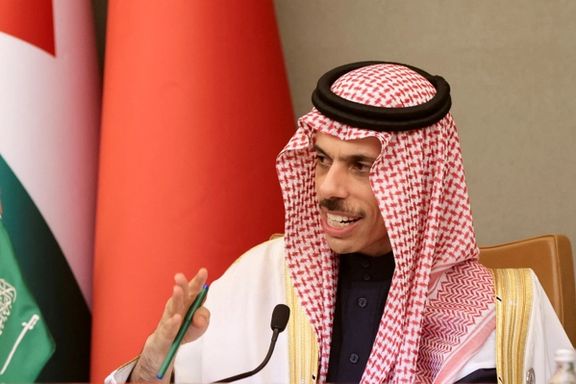
Saudi Arabia says the nuclear deal with the Islamic Republic is not “ideal” and that any agreement must address the concerns of neighboring countries.

Saudi Arabia says the nuclear deal with the Islamic Republic is not “ideal” and that any agreement must address the concerns of neighboring countries.
Foreign Minister Faisal bin Farhan made the remarks on Tuesday in London telling reporters that Riyadh is open to hold negotiations with Tehran.
Saudi Arabia has time and again expressed concerns over “transgressions by Iran”, particularly in its nuclear program.
Saudis say Iran's activities do not match with what Tehran declares about “the peaceful nature” of its nuclear program.
Riyadh and other Sunni Arab government in the region have been concerned about Tehran's meddling in neighboring countries and supporting militant Shiite groups in Iraq, Lebanon and the Houthi forces in Yemen.
Riyadh severed ties with Tehran in January 2016 after a pro-government Iranian mob stormed the Saudi embassy in Tehran following the execution of a Shi'ite cleric in Saudi Arabia.
Consequently, Saudi Arabia cut all trade relations with Iran and banned its citizens from visiting the country for religious pilgrimages.
In 2019, Saudi Arabia’s critical oil processing installations in the east were targeted by kamikaze drones, claimed by the Iran-backed Houthi militias in Yemen. The strikes suspended over half of the nation’s 12 million barrels of daily oil production output.
Sunni Muslim Saudi Arabia and Shiite Iran, which are locked in proxy conflicts around the region, launched direct talks hosted by Iraq in 2021, however the efforts have not been fruitful so far.
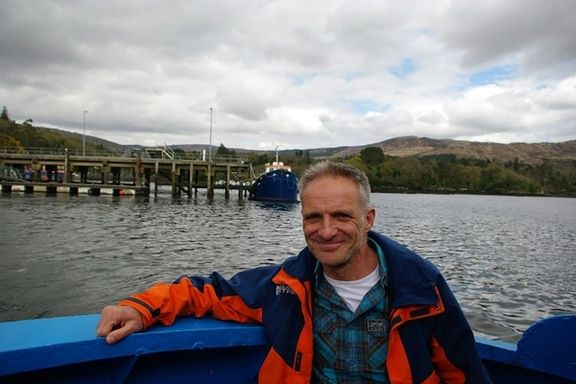
Iran has sentenced Franco-Irish citizen Bernard Phelan to 6.5 years in prison for "providing information to another country", his sister said in a statement.
"The Franco-Irish citizen Bernard Phelan has just been sentenced to 6.5 years in prison in Iran for having provided information to an enemy country," Caroline Phelan said in a statement. She added that her 64-year-old brother was at risk of dying in custody.
"He had been promised an early release for health reasons before this was cancelled."
Ties between France and Iran have deteriorated in recent months with Tehran detaining seven French nationals in what Paris has said are arbitrary arrests that are equivalent to state hostage taking.
Phelan, a tourism consultant, was detained in early October as anti-government protests spread across the country.
France has demanded that Iranian authorities provide him urgent medical care due to a heart condition.
A spokesperson for Ireland's Department of Foreign Affairs said the government was extremely concerned about the case, especially given Phelan’s ill health.
Phelan's sentence comes just days after a second French national, Benjamin Briere, who has been held since May 2020 after being sentenced to eight years, was cleared of all charges and ordered to be released from prison, his lawyer said in a statement on March 2.
However, he has since remained in custody without a reason given for his ongoing detention.
In recent years, Iran's elite Revolutionary Guards have arrested dozens of dual nationals and foreigners, mostly on charges related to espionage and security.
Rights groups have accused Iran of trying to extract concessions from other countries through such arrests. Iran, which does not recognize dual nationality, denies taking prisoners to gain diplomatic leverage.
Report by Reuters

The US-based Human Rights Activists News Agency (HRANA) has described the situation of women in Iran as "dire" on International Women's Day, March 8.
Protests and violent unrest since September, triggered by the death in custody of Mahsa Amini, arrested by the morality police for not wearing her hijab properly, have led to a shocking 66 female deaths including at least 14 female death-row inmates being executed in different prisons and two women receiving the death penalty.
With women having been at the forefront of protests, burning headscarves and cutting hair in protest against the oppression of the Islamic Republic, the rights group said "at least 3,953 women were arrested, of which 1,019 were identified by HRANA, [and]160 of them were female university students.”
According to HRANA, since September's unrest, at least 2,003 women were reprimanded in different ways, including being summoned to police authorities, due to the improper wearing of the hijab.
The report went on to document the attacks seen across the country on girls' schools and university dormitories, which began on November 30 in Qom.
“Since the beginning of December 2022, at least 290 attacks on schools affecting at least 7,060 students have been reported. This number of affected students is exclusive to the 103 schools that have reported data in this regard,” the group said.
Nearly four months after the beginning of suspected poisonings in schools in Iran, which have now spread to the dormitories of female students, the authorities of the Islamic Republic have failed to provide a convincing clue regarding the attacks.
"Despite the advances in women's situation worldwide, the statistical information shows their situation in Iran is alarming," the group said. "The situation of women in Iran is dire."
Brutality and oppression against women continues, with at least 15 women killed for 'honor reasons, according to the latest report. “Honor killings are a brutal practice in which women are murdered by their family members for bringing 'dishonor' to their family. This practice is not only a violation of women’s rights, but the practice also serves as a grave violation of human rights and the right to life," it said.
Several factors prevent rights groups from analyzing the full scope of violations committed against women in Iranian society and urgent action is required to address the issues faced by women in Iran on a daily basis rooted in gender-based discrimination codified in both law and practice.
"The government must take concrete steps to protect women’s rights, end discriminatory laws and practices, and ensure that perpetrators of violence against women are brought to justice," HRANA's report stated. "On this International Women’s Day, we must continue to raise awareness of the struggles faced by women in Iran and advocate for their rights and equality."
The sentiments of the HRANA report are echoed by rights groups worldwide. In December, Iran was removed from the UN Commission on the Status of Women. Given the situation in Iran, it said: “Iran’s membership at this moment is an ugly stain on the Commission’s credibility.”
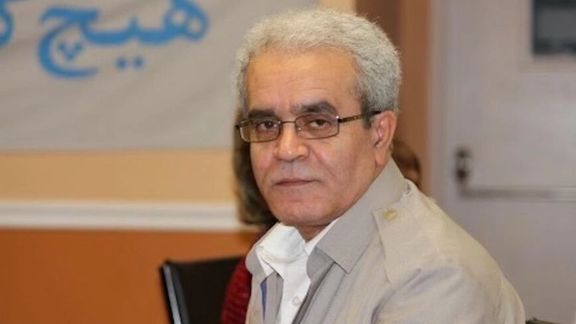
The family of Omar “Chicho" Mahmoudzadeh, a US citizen who was killed in an Iranian ballistic missile and drone attack in Iraq, has sued the Islamic Republic in a US court.
Mahmoudzadeh – along with at least 12 others -- was killed during the Revolutionary Guard’s bombing campaign in late September, when the regime stepped up attacks on Iraq’s Kurdistan region, presumably to pressure Iranian Kurdish opposition groups whom it accused of fomenting the unrest ignited by the death of 22-year-old Kurdish Iranian woman Mahsa Amini in police custody.
The lawsuit, which was filed Monday in the US District Court in Washington DC by Mahmoudzadeh’s wife and daughter, seeks $300 million in punitive and $50 million in compensatory damages “for severe personal injuries and other irreparable harm” suffered as a result of his extrajudicial killing and alleged acts of terrorism by the Islamic Republic and its military arm, the Revolutionary Guards.
The lawsuit is filed under the terrorism exception of the Foreign Sovereign Immunities Act (FSIA) by plaintiffs’ attorney Ali Herischi of Herischi Human Rights Law Center. The provision in the law allows US victims to sue designated state sponsors of terrorism. The IRGC was labeled a foreign terrorist organization in 2019.
The Mahmoudzadeh's lawyer says his death was downplayed by the Biden administration, which condemned the attack at the time, calling it "an unjustified violation of Iraqi sovereignty and territorial integrity." "Regrettably, US officials remained silent in publicly holding Iran accountable," Herischi told Al-Monitor, adding that "It appears that the US has chosen to bury that issue."

According to the 14-page complaint, the IRGC’s strikes were an “organized, tactical operation intended to target Kurdish, Iranian civilians and refugees." Local media said that the IRGC fired more than 70 short-range ballistic missiles and drones at bases that the regime claimed were “operated by separatist terrorists.” The attack in Koysinjaq (Koye) -- an Iraqi Kurdish town some 65 kilometers (40 miles) east of Kurdistan’s capital Erbil -- injured more than 50 people and left behind “mountains of concrete rubble that were once classrooms, hysterical children, [and] shambles of displaced furniture,” the document added.
Mahmoudzadeh was a member of the Kurdistan Democratic Party of Iran (KDPI), an exiled Iranian opposition group seeking greater autonomy for Iran’s Kurds. At the time of the September 28 attack, Mahmoudzadeh was near KDPI’s headquarters in Koye. Born in the western Iranian city of Mahabad, Mahmoudzadeh spent several decades in Iran and Iraq before moving to the United States in 1995. After raising his family in northern Virginia, he returned to Iraq in 2018 to work as a volunteer with refugees in Koya.
The Islamic Republic, however, is not expected to respond in court to the lawsuit. A spokesperson for Iran’s mission to the United Nations told Al-Monitor that Tehran had no information on whether any US citizens were killed in the “precise attack” on a "terrorist headquarters" in Iraq, adding that “If a US citizen was among them, then it's the US government's responsibility to explain why a US citizen was at the terrorists' headquarters."
On Tuesday, German Foreign Minister Annalena Baerbock said during her visit to the Iraqi capital that Iranian missile attacks across the Iraqi border are unacceptable and put regional stability at risk. "With its missile attacks, the Iranian regime shows not only that it recklessly and brutally suppresses its own people, it also puts human life and the stability of the whole region at risk to hold on to power," she said on the same day that US Defense Secretary Lloyd Austin was also visiting Iraq.
Germany, and some other European countries, have adopted a tougher line toward Iran’s suppression of protesters and the IRGC, which is the regime’s arm in cracking down on dissent. So far, the regime’s agents have killed more than 500 civilians.
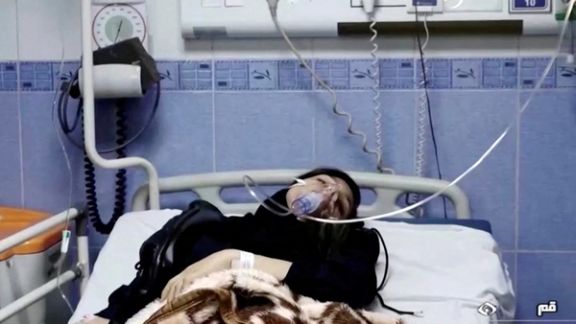
An Iranian official claimed Tuesday that several individuals were arrested for gas attacks on girls’ schools as teachers and parents protested in several cities.
Majid Mirahmadi, deputy interior minister for security affairs, said Tuesday that “a number of individuals” were arrested in five provinces in connection with poisoning attacks on girls’ school without disclosing any details regarding these individuals, their motive and their political or religious affiliations.
“A number of cases [in which the activities of individuals in question] were of non-hostile nature were discovered and they were given corrective guidance,” Mirahmadi said in a news program aired by the state-run television.
In other words, individuals who were not hostile to the regime, most probably loyalists, were free to go after receiving a warning, despite conducting what amounted to chemical attacks on children and minors.
The announcement which immediately became controversial was easily interpreted as an admission of the involvement of extremists from within the regime or protected by it.
Actor Reza Kianian has been indicted for sharing this poster on social media which implies involvement of security forces in school poisonings.
Many ordinary Iranians have been suspicious of involvement of the regime itself, or religious extremists protected by the regime, in the school attacks and call the acts “state terrorism”.
Interestingly, so far most officials and state media were claiming that schoolgirls were attacked by foreign intelligence services.
“I’m sorry, but you must be extremely inefficient in ensuring children’s safety if you are right in claiming that students’ poisoning is the work of foreign countries and not your own doing,” a student told ultra-hardliner politician and former nuclear negotiator Saeed Jalili at a panel discussion at Chamran University in Ahvaz Monday while other students cheered him loudly.
Suspicions were fueled by the fact that the first attack on November 30, and several of the subsequent ones, occurred in the religious city of Qom, a bastion of hardliners and fundamentalists and home to most of Iran's Shia seminaries.
The suspicions, which many expressed on social media, grew even stronger when a spate of attacks was reported in Boroujerd in western Iran in late February and then in other cities such as the capital Tehran without any action by the government to stop the perpetrators.
People protesting in Sanandaj in western Iran chanting “Scoundrels, scoundrels” against security forces.
Critics pointed out that authorities had remained silent about the incidents for over two months, were dismissive of the seriousness of the school attacks until they spread to too many schools and too many cities to be ignored. The government also tried to attribute the symptoms to “underlying health conditions” and fear and stress-induced illness and blamed the opposition and foreign countries when they finally acknowledged the attacks. Many also said the attacks could also be revenge against women and the Woman, Life, Freedom protesters.
Critics also argued that the reticence of the many intelligence and security agencies of the country was uncharacteristic as these agencies, such as the Revolutionary Guards Intelligence Organization (SAS) and the interior ministry are always quick in arresting peaceful protesters and dissidents even for posting on social media.
Security forces tried to disperse protesters and arrested several at teachers and parents rally Tuesday in Shiraz.
On Monday, for the first time since the first attack more than three months ago, Supreme Leader Ali Khamenei addressed the issue. “If there are really hands at work, or individuals or groups that are involved in this, this will be a huge crime that cannot be overlooked,” he said, adding that culprits should be given maximum punishment for their crime.
Very uncharacteristically, Khamenei did not attribute the attacks to ‘enemies’ and foreign governments as other officials had been doing in the past couple of weeks. Officials who usually only reiterate what Khamenei says continued accusing ‘the enemies’ of poisoning the schoolgirls even after Khamenei’s brief reference to the issue at a tree-planting ceremony. “These are naturally enemy plots to force schools to shut down and to prevent students’ education,” Education Minister Yousef Nouri said Tuesday.
Meanwhile, Tehran’s prosecutor Ali Salehi on Tuesday announced that an actor, Reza Kianian, reformist politician Azar Mansouri, reformist pundit Sadegh Zibakalam, and managing directors of two reformist newspapers, Shargh Daily and Ham-Mihan, as well as the managing director of Rouydad 24 news website have been indicted for “spreading rumors and lies” about the incidents through the media and social media.
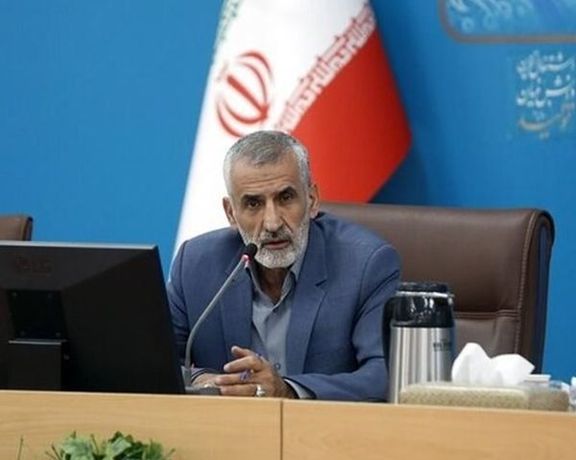
Iran’s Deputy Interior Minister Majid Mirahmadi announced on Tuesday that arrests have been in five provinces in connection with the chemical attacks taking place across the country on female students.
Mirahmadi quickly excused those arrested claiming they were "misguided", many of whom were released soon after having been given "advice" on their behavior.
Hundreds of girls have been targeted since November in a series of unexplained chemical gas poisonings around the country, believed to be aimed at quashing support for unrest triggered by the death of Mahsa Amini, who died in morality police custody after being arrested for not wearing her hijab properly.
"Some who did not have hostile intentions were also guided," Mirahmadi said, though gave no explanation how such attacks which have seen possibly hundreds of girls hospitalized, could be considered "non-hostile".
It suggests Mirahmadi believes the perpetrators to be supporters of the regime, long suspected on the global stage as being behind the spate of attacks which began in the religious city of Qom.
He played down the severity of the attacks which the regime also tried to brand 'mass hysteria', government mouthpieces such as Mohammad Marandi, claiming the attacks were a falsity created by psychosis. On Twitter, Marandi wrote, "Western regimes are responsible. They fund anti-Iran mercenaries to create hysteria & unrest. Western/Saudi Persian media terrorize schoolchildren & their families, while western controlled terror groups are deployed by command centers in Albania & northern Iraq to create unrest."
The deputy minister's statement on Tuesday affirmed the rhetoric, saying "there is no reason for serious concern as the number of cases that have occurred in schools has decreased significantly". Meanwhile, Baluch activists announced that over 300 female students were hospitalized due to gas inhalation in the southeastern city of Zahedan on Monday and chemical attacks continued in schools through Tuesday across several provinces.
The Islamic Republic had earlier blamed "enemies" and even the Farsi-speaking media based abroad as the "perpetrators" of the attacks, and President Ebrahim Raisi also condemned the poisoning of students as "enemy's conspiracy".